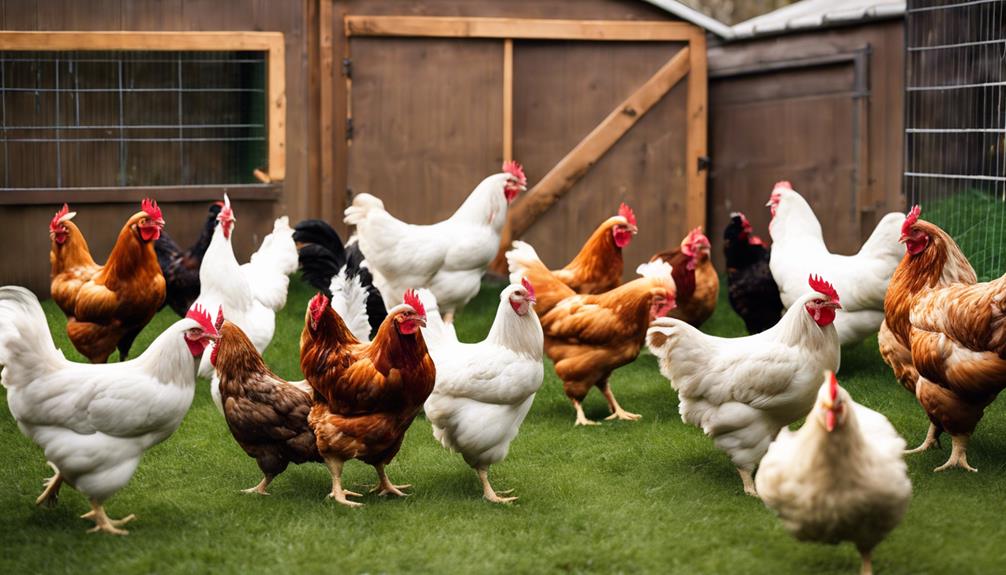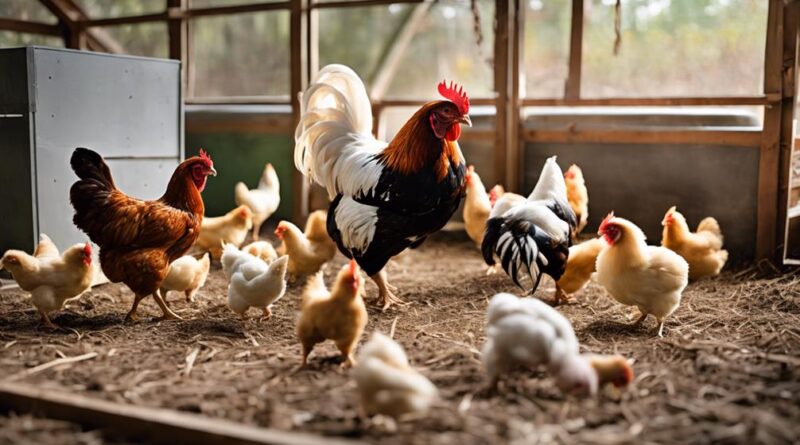7 Best Solutions for Common Chicken Breeding Problems"
If you're facing common chicken breeding challenges, follow these expert solutions. First, check egg production and adjust diet and conditions. Combat feather pecking and deal with broody hens. Prevent diseases by maintaining biosecurity and vaccination. Tackle rooster aggression and improve incubation rates. Manage integrating new birds by closely monitoring behavior. Use socialization techniques for a peaceful flock. Address these issues to ensure optimal chicken breeding success.
Addressing Egg Production Decline
If you notice a decline in egg production from your chickens, promptly assess their diet and living conditions to identify and rectify any potential issues. One common factor contributing to decreased egg laying is a lack of proper nutrition. Ensure your chickens are receiving a balanced diet by providing them with high-quality feed and access to fresh water at all times. Additionally, consider incorporating nutritional supplements into their diet to boost their overall health and egg production.
Another critical aspect to consider is the lighting conditions in your chicken coop. Chickens rely on daylight to regulate their egg-laying cycle. Insufficient light exposure can disrupt this cycle and lead to a decrease in egg production. To address this issue, make lighting adjustments by ensuring your chickens receive 14-16 hours of light per day. You can achieve this by using artificial lighting sources to supplement natural daylight, especially during the shorter days of winter.
Combating Feather Pecking Behavior
To address feather pecking behavior in your chickens, observe their interactions closely and implement environmental enrichment strategies to encourage natural pecking behaviors and reduce aggression within the flock. Feather pecking prevention is crucial to maintain the overall well-being of your chickens and prevent injuries.
One effective method is to provide environmental stimuli that encourage natural foraging behaviors, such as scattering grains or hanging cabbage for pecking. This will keep the chickens engaged and divert their attention from pecking at each other's feathers.
Behavior modification techniques can also be employed to address feather pecking. One approach is to use deterrents like bitter-tasting sprays on the feathers of birds that are being pecked. This unpleasant taste can deter the pecking behavior over time. Additionally, increasing the space available to the chickens and providing hiding spots or barriers can help reduce stress and minimize aggressive interactions.
Another important aspect to consider is the nutritional needs of your chickens. Ensure they've a balanced diet with adequate nutrients to prevent deficiencies that may lead to abnormal behaviors like feather pecking. Providing access to grit and oyster shells can also help maintain their digestive health and prevent boredom-induced pecking.
Handling Broody Hen Situations
When handling broody hen situations, assess the hen's behavior and nesting habits to determine the best course of action for maintaining a healthy flock. Broodiness is a natural instinct in hens, but if not managed properly, it can lead to issues such as decreased egg production and aggression towards other flock members. One common strategy is to move the broody hen to a separate area with a comfortable nest box to encourage her to incubate eggs without disrupting the rest of the flock. Ensure the nest box is in a quiet, dimly lit area to promote a sense of security for the hen.
Monitoring humidity levels in the nest box is crucial for successful incubation. Ideally, the humidity should be around 50-55% for the first 18 days of incubation and then increased to 65% for the final days before hatching. This helps prevent the eggs from drying out and facilitates the hatching process. Providing the broody hen with access to fresh water and nutritious food nearby is essential to support her during this period.
If a broody hen is causing disruptions within the flock, gently remove her and place her in the designated nest box. By understanding and addressing the needs of a broody hen, you can effectively manage the situation and maintain a harmonious and healthy flock.
Preventing Disease Outbreaks
Addressing the health of your flock involves implementing effective strategies to prevent disease outbreaks, ensuring the well-being of your chickens. To safeguard your chickens against diseases, it's crucial to prioritize biosecurity measures, vaccination protocols, sanitation practices, and quarantine procedures.
Biosecurity measures are essential in preventing the introduction and spread of diseases within your flock. Limiting access to your chicken coop, controlling visitors, and ensuring that equipment is properly cleaned and disinfected can significantly reduce the risk of disease transmission. Additionally, establishing a strict vaccination protocol based on the specific diseases prevalent in your area can help build immunity and protect your chickens from potential outbreaks.
Maintaining high standards of sanitation is key to preventing disease outbreaks. Regularly clean and disinfect your coop, feeders, and waterers to eliminate potential disease-causing pathogens. Proper waste management and ensuring a clean environment for your chickens to live in can greatly reduce the risk of infections.
In case a new chicken is introduced to your flock or if a chicken falls ill, implementing quarantine procedures is vital. Isolating sick or new chickens from the rest of the flock can help prevent the spread of diseases. Monitor quarantined birds closely for any signs of illness and only reintroduce them once they're deemed healthy by a veterinarian.
Resolving Rooster Aggression Issues
Implementing effective strategies to address rooster aggression issues can help maintain a harmonious and safe environment within your chicken flock. Roosters can sometimes display aggressive behavior towards humans or other chickens, posing a risk to the overall well-being of the flock. By utilizing rooster training techniques and behavior modification strategies, you can effectively manage and reduce rooster aggression.
Here are some key approaches to consider:
- Positive Reinforcement: Utilize rewards such as treats or praise to reinforce positive behaviors in your rooster. This can help encourage calm and non-aggressive actions, creating a more docile bird over time.
- Establishing Dominance: Show your rooster that you're the dominant figure in the flock. By asserting your authority through confident body language and consistent interactions, you can help curb aggressive tendencies.
- Separation and Isolation: If a rooster continues to display aggression despite training efforts, consider isolating him from the flock for a period. This separation can help disrupt negative behavior patterns and give the rooster time to recalibrate his social interactions.
Improving Incubation Success Rates
To enhance the success rates of incubation, focus on optimizing environmental conditions and monitoring egg development closely. Temperature control and humidity levels are crucial factors for a successful incubation process. Ensure the temperature inside the incubator remains stable between 99.5-100.5°F (37.5-38°C) throughout the incubation period. Fluctuations can lead to developmental issues or reduced hatch rates. Similarly, maintaining proper humidity levels between 45-55% during the first 18 days and increasing it to 65% during the final days before hatching is essential for the eggs to hatch successfully.
In addition to temperature and humidity, turning frequency plays a significant role in the development of the embryos. Eggs should be turned at least three to five times a day for the first 18 days to prevent the yolk from sticking to the membrane, allowing the embryo to develop correctly. Proper ventilation needs to be addressed as well to ensure the exchange of oxygen and carbon dioxide within the incubator, promoting healthy chick development.
Managing Flock Integration Challenges

When managing flock integration challenges, prioritize gradual introductions to minimize stress and potential conflicts among the chickens. This approach allows the birds to establish new coop dynamics and adjust to changes in the pecking order more smoothly.
Here are some key strategies to help you successfully integrate new chickens into your existing flock:
- Socialization Strategies: Implement socialization techniques such as supervised interactions in a neutral territory outside of the coop. This can help the chickens get acquainted without the pressure of defending their established territories.
- Integration Process: Gradually introduce new chickens to the existing flock by keeping them separated initially but within sight of each other. Over time, increase their exposure to each other until they're ready to cohabitate. This gradual integration process can help reduce aggression and ensure a smoother transition.
- Observation and Intervention: Monitor the flock closely during the integration process to identify any signs of aggression or bullying. If necessary, be prepared to intervene by separating birds that are engaging in excessive pecking or aggression until they can coexist peacefully.
Frequently Asked Questions
How Can I Protect My Chickens From Predators?
To protect your chickens from predators, consider installing predator deterrents like motion-activated lights or alarms. Secure fencing is crucial; reinforce coop walls and bury wire mesh to prevent digging.
Regularly inspect your setup for weaknesses, and remove any potential hiding spots for predators. By being proactive and implementing these measures, you can help keep your chickens safe and secure from threats.
What Is the Best Bedding Material for Chicken Coops?
When looking for the best bedding material for your chicken coop, consider factors like dust bathing and nesting boxes.
Pine shavings are a popular choice as they help with odor control and are comfortable for your chickens.
Straw is another option that can provide good insulation and is easy to replace.
Make sure to regularly clean and replace bedding to maintain a healthy coop environment for your feathered friends.
Can Chickens Eat Certain Types of Kitchen Scraps?
Chickens can eat certain types of kitchen scraps, but it's important to consider food safety and nutritional benefits. Avoid feeding them anything that could be harmful, like spoiled food or items high in salt or sugar.
Opt for nutritious scraps like vegetable peels, fruit scraps, or cooked grains. These can provide additional vitamins and minerals to supplement their diet, but always ensure the scraps are safe and appropriate for your chickens.
Should I Provide Supplements in My Chickens' Diet?
You should consider providing supplements in your chickens' diet to ensure they meet their nutritional requirements and enjoy various health benefits. Supplements can fill in any gaps in their diet, promoting optimal health and egg production.
However, it's important to choose supplements carefully and not rely solely on them. A balanced diet with supplements can help your chickens thrive and stay healthy.
How Often Should I Clean My Chicken Coop?
Cleaning your chicken coop regularly is crucial for maintaining the health of your flock and controlling odor. Aim to clean it at least once a week, removing soiled bedding, droppings, and any debris.
This routine not only promotes a healthier environment but also helps prevent the buildup of harmful bacteria and pests. Regular coop maintenance contributes to the overall well-being of your chickens and ensures a more pleasant coop atmosphere.
Conclusion
In conclusion, by addressing common chicken breeding problems with the right solutions, you can improve the overall health and productivity of your flock.
From managing egg production decline to resolving rooster aggression issues, taking proactive steps will ensure a successful and thriving chicken operation.
By implementing these best practices, you can create a harmonious environment for your chickens and enjoy the benefits of a well-maintained, high-performing flock.
